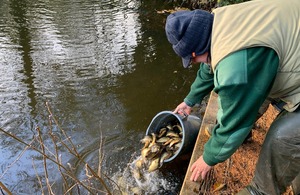Fish populations get a festive boost in the West Midlands
Thousands of fish have found new homes in the West Midlands in time for Christmas thanks to the Environment Agency’s annual stocking programme.

- Thousands of fish bred at Environment Agency’s national fish farm in Calverton, Nottinghamshire provide a festive boost to West Midlands waterways
- Releasing fish encourages river restoration and recovery and helps to boost existing wild fisheries
- The Environment Agency is encouraging people to try fishing, which has wellbeing benefits
A total of 34,600 fish have been stocked into waterways in the West Midlands, including roach, rudd, tench, bream, dace, barbel and crucian carp. They have all been reared at the Environment Agency’s National Coarse Fish Farm in Calverton, Nottinghamshire.
Every year, the fish farm breeds coarse fish for release into rivers and still waters across England to help boost fish populations. The stockings also provide a welcome boost to the angler experience in the area.
Responsible fishing provides a good opportunity to connect with nature and feel the range of benefits doing so can bring. However, it is important to remember that a valid rod fishing licence is required, and anglers must adhere to fishing byelaws and fishery rules.
Tom Morgan, Fisheries Technical Officer for the Environment Agency in the West Midlands, said:
“While there are healthy amounts of fish in the West Midlands waterways, occasionally a helping hand is needed to restore the natural balance following a pollution incident or decline, or to create new fisheries and opportunities for anglers.
“The work of our national fish farm is funded by income from licence fees, so in the lead up to Christmas it’s great to see the fish farm continuing to produce strong and healthy fish needed for stocking and recovery. The fish and larvae they produce plays an important role in the Environment Agency’s work to restore sustainable fisheries in England.
“The stocking is part of an annual programme funded by income from rod licence sales. Stocking occurs in winter because water temperatures are low and this minimises any stress on the fish, giving them the best possible survival rates.
“Christmas is a good time to introduce the fish into rivers, as it enables them to acclimatise to their new surroundings, ahead of their spawning season in the spring. Fish also play a critical role in sustaining a river’s finely-balanced eco-system, so the wider natural environment will also get a festive boost.”
You need a rod fishing licence to fish for salmon, trout, freshwater fish, smelt or eel with a rod and line in England. Get yours from www.gov.uk/fishing-licences.
Further information
Income from rod fishing licence sales is used to fund our work to protect and improve fish stocks and fisheries. This includes improving habitats for fish, reinvesting money back to facilities and clubs for anglers, tackling illegal fishing and working with partners to encourage more people to give fishing a go.
For more information: https://www.gov.uk/government/news/nearly-21-million-invested-in-fisheries-across-england-through-fishing-licence-sales
Calverton Fish Farm
The Environment Agency’s National Coarse Fish Farm at Calverton, Nottinghamshire remains our principal supply of coarse fish for stocking. This is funded by fishing licence income.
It rears fish to help:
- replenish stocks after an environmental incident
- kick-start the recovery of fisheries after they have recovered from long term issues, for example pollution
In 2022 to 2023 we have stocked 455,439 fish into rivers and stillwaters around the country. This was made up of the following species:
- barbel – 127,450
- bream – 56,800
- chub – 53,800
- dace – 42,777
- roach – 66,500
- crucian carp – 22,927
- tench – 25,425
- rudd – 19,760
- grayling – 40,000
These were a mixture of 1 and 2 year old fish. In addition to that figure, we also stocked more than 2.4 million advanced reared fish larvae.
For all media enquiries please call 0800 917 9264, including out of hours
www.environment-agency.gov.uk
Follow us on Twitter @EnvAgencyMids